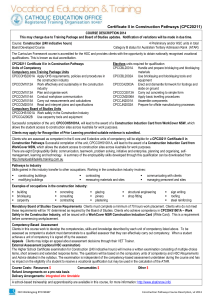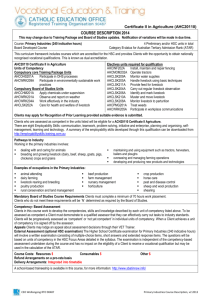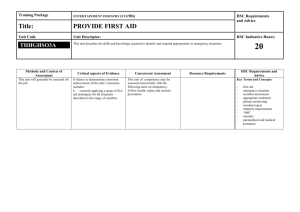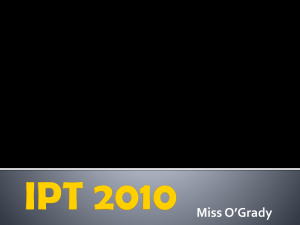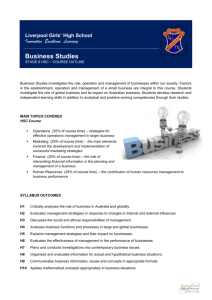VET subject descriptors
advertisement
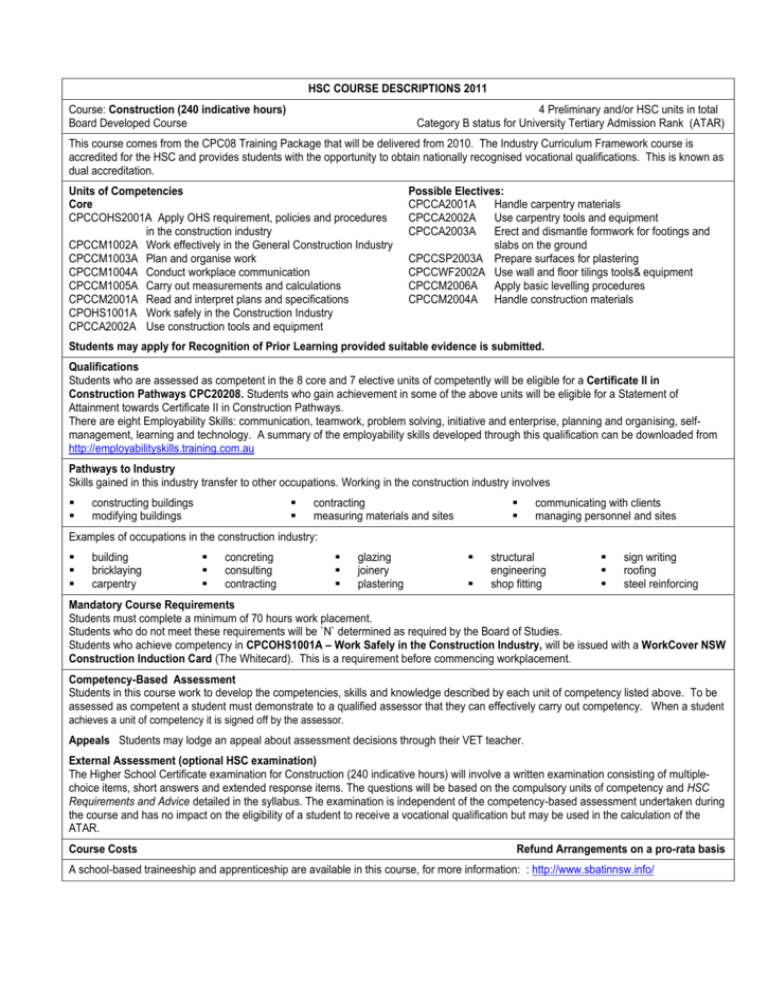
HSC COURSE DESCRIPTIONS 2011 Course: Construction (240 indicative hours) Board Developed Course 4 Preliminary and/or HSC units in total Category B status for University Tertiary Admission Rank (ATAR) This course comes from the CPC08 Training Package that will be delivered from 2010. The Industry Curriculum Framework course is accredited for the HSC and provides students with the opportunity to obtain nationally recognised vocational qualifications. This is known as dual accreditation. Units of Competencies Core CPCCOHS2001A Apply OHS requirement, policies and procedures in the construction industry CPCCM1002A Work effectively in the General Construction Industry CPCCM1003A Plan and organise work CPCCM1004A Conduct workplace communication CPCCM1005A Carry out measurements and calculations CPCCM2001A Read and interpret plans and specifications CPOHS1001A Work safely in the Construction Industry CPCCA2002A Use construction tools and equipment Possible Electives: CPCCA2001A Handle carpentry materials CPCCA2002A Use carpentry tools and equipment CPCCA2003A Erect and dismantle formwork for footings and slabs on the ground CPCCSP2003A Prepare surfaces for plastering CPCCWF2002A Use wall and floor tilings tools& equipment CPCCM2006A Apply basic levelling procedures CPCCM2004A Handle construction materials Students may apply for Recognition of Prior Learning provided suitable evidence is submitted. Qualifications Students who are assessed as competent in the 8 core and 7 elective units of competently will be eligible for a Certificate II in Construction Pathways CPC20208. Students who gain achievement in some of the above units will be eligible for a Statement of Attainment towards Certificate II in Construction Pathways. There are eight Employability Skills: communication, teamwork, problem solving, initiative and enterprise, planning and organising, selfmanagement, learning and technology. A summary of the employability skills developed through this qualification can be downloaded from http://employabilityskills.training.com.au Pathways to Industry Skills gained in this industry transfer to other occupations. Working in the construction industry involves constructing buildings modifying buildings contracting measuring materials and sites communicating with clients managing personnel and sites Examples of occupations in the construction industry: building bricklaying carpentry concreting consulting contracting glazing joinery plastering structural engineering shop fitting sign writing roofing steel reinforcing Mandatory Course Requirements Students must complete a minimum of 70 hours work placement. Students who do not meet these requirements will be `N` determined as required by the Board of Studies. Students who achieve competency in CPCOHS1001A – Work Safely in the Construction Industry, will be issued with a WorkCover NSW Construction Induction Card (The Whitecard). This is a requirement before commencing workplacement. Competency-Based Assessment Students in this course work to develop the competencies, skills and knowledge described by each unit of competency listed above. To be assessed as competent a student must demonstrate to a qualified assessor that they can effectively carry out competency. When a student achieves a unit of competency it is signed off by the assessor. Appeals Students may lodge an appeal about assessment decisions through their VET teacher. External Assessment (optional HSC examination) The Higher School Certificate examination for Construction (240 indicative hours) will involve a written examination consisting of multiplechoice items, short answers and extended response items. The questions will be based on the compulsory units of competency and HSC Requirements and Advice detailed in the syllabus. The examination is independent of the competency-based assessment undertaken during the course and has no impact on the eligibility of a student to receive a vocational qualification but may be used in the calculation of the ATAR. Course Costs Refund Arrangements on a pro-rata basis A school-based traineeship and apprenticeship are available in this course, for more information: : http://www.sbatinnsw.info/ HSC COURSE DESCRIPTIONS 2011 Course: Business Services (240 indicative hours) Board Developed Course 4 Preliminary and/or HSC units in total Category B status for Australian Tertiary Admission Rank (ATAR) This curriculum framework includes courses which are accredited for the HSC and provides students with the opportunity to obtain nationally recognised vocational qualifications. This is known as dual accreditation. Units of Competencies Compulsory BSBCMM201A Communicate in the workplace BSBCUS201A Deliver a service to customers BSBIND201A Work effectively in a business environment BSBINM201A Process and maintain workplace information BSBOHS201A Participate in OHS processes BSBSUS201A Participate in environmentally sustainable work practices BSBWOR202A Organise and complete daily work activities BSBWOR203A BSBWOR204A Electives BSBINM202A BSBITU102A BSBITU201A BSBCMN214A BSBITU203A BSBADM311A Work effectively with others Use business technology Handle mail Develop keyboard skills Produce simple word processed documents Create and use spreadsheets Communicate electronically Maintain Business resources Students may apply for Recognition of Prior Learning provided suitable evidence is submitted. Qualifications Students who are assessed as competent in the above units will eligible for Certificate II in Business BSB20107. There are eight Employability Skills: communication, teamwork, problem solving, initiative and enterprise, planning and organising, selfmanagement, learning and technology. A summary of the employability skills developed through this qualification can be downloaded from http://employabilityskills.training.com.au Pathways to Industry Skills gained in this industry transfer to other occupations. Working in the business services industry involves customer (client) service organising information and records in both paper and electronic forms teamwork using technologies creating documents Examples of occupations in the business services industry: office manager personnel clerk project manager sales clerk/officer secretary manager/owner of a small business payroll clerk/officer personal assistant Mandatory Course Requirements Students must complete a minimum of 70 hours work placement. Students who do not meet these requirements will be `N` determined as required by the Board of Studies. Competency- Based Assessment Students in this course work to develop the competencies, skills and knowledge described by each unit of competency listed above. To be assessed as competent a student must demonstrate to a qualified assessor that they can effectively carry out tasks to industry standard. Students will be progressively assessed as ‘competent’ or ‘not yet competent’ in individual units of competency. When a student achieves a unit of competency it is signed off by the assessor. Appeals Students may lodge an appeal about assessment decisions through their VET teacher. External Assessment (optional HSC examination) The Higher School Certificate examination for Business Services (240 indicative hours) will involve a written examination consisting of multiple-choice items, short answers and extended response items. The questions will be based on units of competency and HSC Requirements and Advice detailed in the syllabus. The examination is independent of the competency-based assessment undertaken during the course and has no impact on the eligibility of a student to receive a vocational qualification but may be used in the calculation of the ATAR. Course Costs Refund Arrangements on a pro-rata basis A school-based traineeship is available in this course, for more information: http://www.sbatinnsw.info/ HSC COURSE DESCRIPTIONS 2011 Course: Hospitality (240 indicative hours) Multi-skilling Board Developed Course 4 Preliminary and/or HSC units in total Category B status for Australian Tertiary Admission Rank (ATAR) This curriculum framework includes courses which are accredited for the HSC and provides students with the opportunity to obtain nationally recognised vocational qualifications. This is known as dual accreditation. Units of Competency Compulsory SITHIND001A Develop and update hospitality industry knowledge SITXCOM001A Work with colleagues and customers SITXCOM002A Work in socially diverse environment SITXENV001A Participate in environmentally sustainable work practices SITXOHS001A Follow health, safety and security procedures SITXOHS002A Follow workplace hygiene procedures Food and Beverage Stream SITHACS006A Clean premises and equipment SITHFAB003A Serve food and beverage to customers SITHFAB010A Prepare and serve non-alcoholic beverages SITXFSA001A Implement food safety procedures Elective SITHCCC001A Organise and prepare food SITHCCC007A Prepare sandwiches SITHFAB012A Prepare and serve espresso coffee SITXCOM004A Communicate on the telephone SITHIND002A Apply hospitality skills in the workplace Students may apply for Recognition of Prior Learning provided suitable evidence is submitted. Qualifications Students who are assessed as competency in all of the above units of competency will be eligible for the Certificate II in Hospitality (SIT20207). Students who gain achievement in some of the above units will be eligible for a Statement of Attainment showing partial completion of Certificate II in Hospitality (SIT20207). There are eight Employability Skills: communication, teamwork, problem solving, initiative and enterprise, planning and organising, selfmanagement, learning and technology. A summary of the employability skills developed through this qualification can be downloaded from http://employabilityskills.training.com.au. Pathways to Industry Skills gained in this industry transfer to other occupations. Working in the hospitality industry involves: Supporting and working with colleagues to meet goals and provide a high level of customer service prepare menus, managing resources, preparing, cooking and serving a range of dishes Examples of occupations in the hospitality industry: breakfast cook barista trainee chef café assistant short order cook fast food cook Mandatory Course Requirements Students must complete a minimum of 70 hours work placement. Students who do not meet these requirements will be ‘N’ determined as required by the Board of Studies. Competency – Based Assessment Students in this course work to develop the competencies, skills and knowledge described by each unit of competency listed above. To be assessed as competent a student must demonstrate to a qualified assessor that they can effectively carry out competency. When a student achieves a unit of competency it is signed off by the assessor. Appeals Students may lodge an appeal about assessment decisions through their VET teacher. External Assessment (optional HSC examination) The Higher School Certificate examination for Hospitality (240 indicative hours) will involve a written examination consisting of multiplechoice items, short answers and extended response items. The questions will be based on units of competency and HSC Requirements and Advice detailed in the syllabus. The examination is independent of the competency-based assessment undertaken during the course and has no impact on the eligibility of a student to receive a vocational qualification. Course costs Refund Arrangements on a pro-rata basis A school-based traineeship and apprenticeship are available in this course, for more information : http://www.sbatinnsw.info/ HSC COURSE DESCRIPTIONS 2011 Course: Information Technology (240 indicative hours) Board Developed Course 4 Preliminary and/or HSC units in total Category B status for Australian Tertiary Admission Rank (ATAR) This curriculum framework includes courses which are accredited for the HSC and provides students with the opportunity to obtain nationally recognised vocational qualifications. This is known as dual accreditation. Units of Competencies ICAD3218B Create user documentation ICAI3020B install and optimise operating system software ICAS3031B Provide advice to clients ICAS3234B Care for computer hardware ICAT3025B Run standard diagnosis tests ICAU1128B Operate a personal computer ICAU2231B Use computer operating system ICAU3004B Apply occupational health & safety procedures ICAW2001B Work effectively in an IT environment ICAB4169B ICAD2012B ICAU2005B ICAU2006B ICAU2013B ICAW2002B BSBCMN106A Use development software and IT tools to build a basic website Design organisational documents using computing packages Operate computer hardware Operate computing packages Integrate commercial computing packages Communicate in the workplace Follow workplace safety procedures Students may apply for Recognition of Prior Learning provided suitable evidence is submitted. Qualifications Students who are assessed as competent in the above units of competency will be eligible for a Statement of Attainment showing partial completion of Certificate III in Information Technology ICA30105. There are eight Employability Skills: communication, teamwork, problem solving, initiative and enterprise, planning and organising, selfmanagement, learning and technology. A summary of the employability skills developed through this qualification can be downloaded from http://employabilityskills.training.com.au Pathways to Industry Working in the information technology industry involves: designing web pages supporting computer users networking computers communicating with clients finding solutions to software problems Examples of occupations in the information technology industry Service technician e-business development manager help desk office internet specialist IT consultant IT project manager Multimedia developer Network administrator On-line service support officer Programmer Software developer Systems engineer IT teacher / trainer Technical support officer Web designer Mandatory Course Requirements Students must complete a minimum of 70 hours work placement. Students who do not meet these requirements will be `N` determined as required by the Board of Studies. Competency- Based Assessment Students in this course work to develop the competencies, skills and knowledge described by each unit of competency listed above. To be assessed as competent a student must demonstrate to a qualified assessor that they can effectively carry out to industry standard. Students will be progressively assessed as ‘competent’ or ‘not yet competent’ in individual units of competency When a student achieves a unit of competency it is signed off by the assessor. Appeals Students may lodge an appeal about assessment decisions through their VET teacher. External Assessment (optional HSC examination) The Higher School Certificate examination for Information Technology (240 indicative hours) will involve a written examination consisting of multiple-choice items, short answers and extended response items.The questions will be based on units of competency and HSC Requirements and Advice detailed in the syllabus. The examination is independent of the competency-based assessment undertaken during the course and has no impact on the eligibility of a student to receive a vocational qualification but may be used in the calculation of the ATAR. Course costs Exclusions Refund Arrangements on a pro-rata basis Computing Applications CEC. HSC COURSE DESCRIPTIONS 2011 A school-based traineeship is available in this course, for more information: http://www.sbatinnsw.info/ Course: Metal and Engineering (240 indicative hours) 4 Preliminary and/or HSC units in total Board Developed Course Category B status for Australian Tertiary Admission Rank (ATAR) This curriculum framework includes courses which are accredited for the HSC and provides students with the opportunity to obtain nationally recognised vocational qualifications. This is known as dual accreditation. Units of Competencies Compulsory n/a Manufacturing, Engineering and related services Industries induction MEM13014A Apply principles of occupational health and safety in the work environment MEM09002B Interpret Technical Drawings MEM14004A Plan to undertake a routine task MEM18001C Use hand tools MEM18002B Use power tools/hand held operations MEM16007A Work with others in a manufacturing, engineering or related environment MEM12024A MEM12023A MEM15002A MEM15024A Electives MEM05005B MEM05004C MEM05012C MEM03003B MEM05050B Perform computations Perform engineering measurements Apply quality systems Apply quality procedures Carry out mechanical cutting Perform routine Oxy Acetylene welding Perform routine manual arc welding Perform sheet and plate assembly Perform gas metal arc welding Students may apply for Recognition of Prior Learning provided suitable evidence is submitted. Qualifications Students who are assessed as competent in the above units of competency will be eligible for a Certificate II in Engineering MEM 20105. There are eight Employability Skills: communication, teamwork, problem solving, initiative and enterprise, planning and organising, selfmanagement, learning and technology. A summary of the employability skills developed through this qualification can be downloaded from http://employabilityskills.training.com.au Pathways to Industry Working in the metal and engineering industry involves: constructing assembling installing modifying repairing and maintaining machines assembling making parts equipment machines instruments and tools designing machinery parts computer hardware and electronic circuits leading projects toolmaker maintenance fitter manager/owner of a small business using 3D graphics and drafting skills managing clients and staff overseeing quotas and information Examples of occupations in the metal and engineering industry. fitter engineer (automotive, fabrications, production, plastics, marine, mechanical) refrigeration and air conditioning mechanic structural steel and welding supervisor locksmith machinist plumber Mandatory Course Requirements Students must complete a minimum of 76 hours work placement. Students who do not meet these requirements will be `N` determined as required by the Board of Studies. Competency- Based Assessment Students in this course work to develop the competencies, skills and knowledge described by each unit of competency listed above. To be assessed as competent a student must demonstrate to a qualified assessor that they can effectively carry out tasks to industry standard. Students will be progressively assessed as ‘competent’ or ‘not yet competent’ in individual units of competency When a student achieves a unit of competency it is signed off by the assessor. Appeals Students may lodge an appeal about assessment decisions through their VET teacher. External Assessment (optional HSC examination) The Higher School Certificate examination for Metal and Engineering (240 indicative hours) will involve a written examination consisting of multiple-choice items, short answers and extended response items. The questions will be based on units of competency and HSC Requirements and Advice detailed in the syllabus. The examination is independent of the competency-based assessment undertaken during the course and has no impact on the eligibility of a student to receive a vocational qualification but may be used in the calculation of the ATAR. Course costs Exclusions Industrial Technology – Metals and Engineering Industries Refund Arrangements on a pro – rata basis Works developed for assessment are not to be used either in full or in part for assessment in any other subject A school-based traineeship and apprenticeship are available in this course, for more information: http://www.sbatinnsw.info/ HSC COURSE DESCRIPTIONS 2011 Course: Retail Services (240 indicative hours) Board Developed Course 4 Preliminary and/or HSC units in total Category B status for Australian Tertiary Admission Rank (ATAR) This curriculum framework includes courses which are accredited for the HSC and provides students with the opportunity to obtain nationally recognised vocational qualifications. This is known as dual accreditation. Units of Competencies Compulsory SIRXCCS001A Apply point-of-sale handling procedures SIRXCCS002A Interact with customers SIRXCLM001A Organise and maintain work areas SIRXCOM001A Communicate in the workplace SIRXICT001A Operate retail technology SIRXIND001A Work effectively in a retail environment SIRXINV001A Perform stock control procedures SIRXOHS001A Apply safe working practices SIRXRSK001A Minimise theft General Selling Stream SIRXMER001A Merchandise products SIRXSLS001A Sell products and services SIRXSLS002A Advise on products and services Electives SIRXFIN001A Balance point-of-sale terminal SIRXFIN002A Perform retail finance duties Students may apply for Recognition of Prior Learning provided suitable evidence is submitted. Qualifications Student who are assessed as competent in the above units of competency will be eligible for a Certificate II in Retail (SIR20207) There are eight Employability Skills: communication, teamwork, problem solving, initiative and enterprise, planning and organising, selfmanagement, learning and technology. A summary of the employability skills developed through this qualification can be downloaded from http://employabilityskills.training.com.au Pathways to Industry Working in the retail industry involves: customer service stock control teamwork designing and creating displays using cash registers, scanners, computers, telephones Example of occupations in the retail industry: buyer customer service assistant stock controller department manager human resource manager marketing manager visual merchandise merchandise sales manager small business owner/manager manager/owner of a small business sales person Mandatory Course Requirements Students must complete a minimum of 70 hours work placement. Students who do not meet these requirements will be `N` determined as required by the Board of Studies. Competency-Based Assessment Students in this course work to develop the competencies, skills and knowledge described by each unit of competency listed above. To be assessed as competent a student must demonstrate to a qualified assessor that they can effectively carry out tasks to industry standards. Students will be progressively assessed as ‘competent’ or ‘not yet competent’ in individual units of competency. When a student achieves a unit of competency it is signed off by the assessor. Appeals Students may lodge an appeal about assessment decisions through their VET teacher. External Assessment (optional HSC examination) The Higher School Certificate examination for Retail (240 indicative hours) will involve a written examination consisting of multiple-choice items, short answers and extended response items. The questions will be based on units of competency and HSC Requirements and Advice detailed in the syllabus. The examination is independent of the competency-based assessment undertaken during the course and has no impact on the eligibility of a student to receive a vocational qualification but may be used in the calculation of the ATAR. Course costs Refund Arrangements on a pro-rata basis A school-based traineeship is available on this course, for more information: http://www.sbatinnsw.info/

